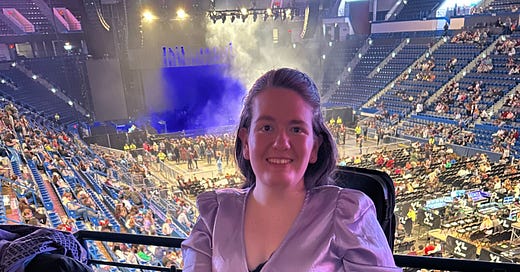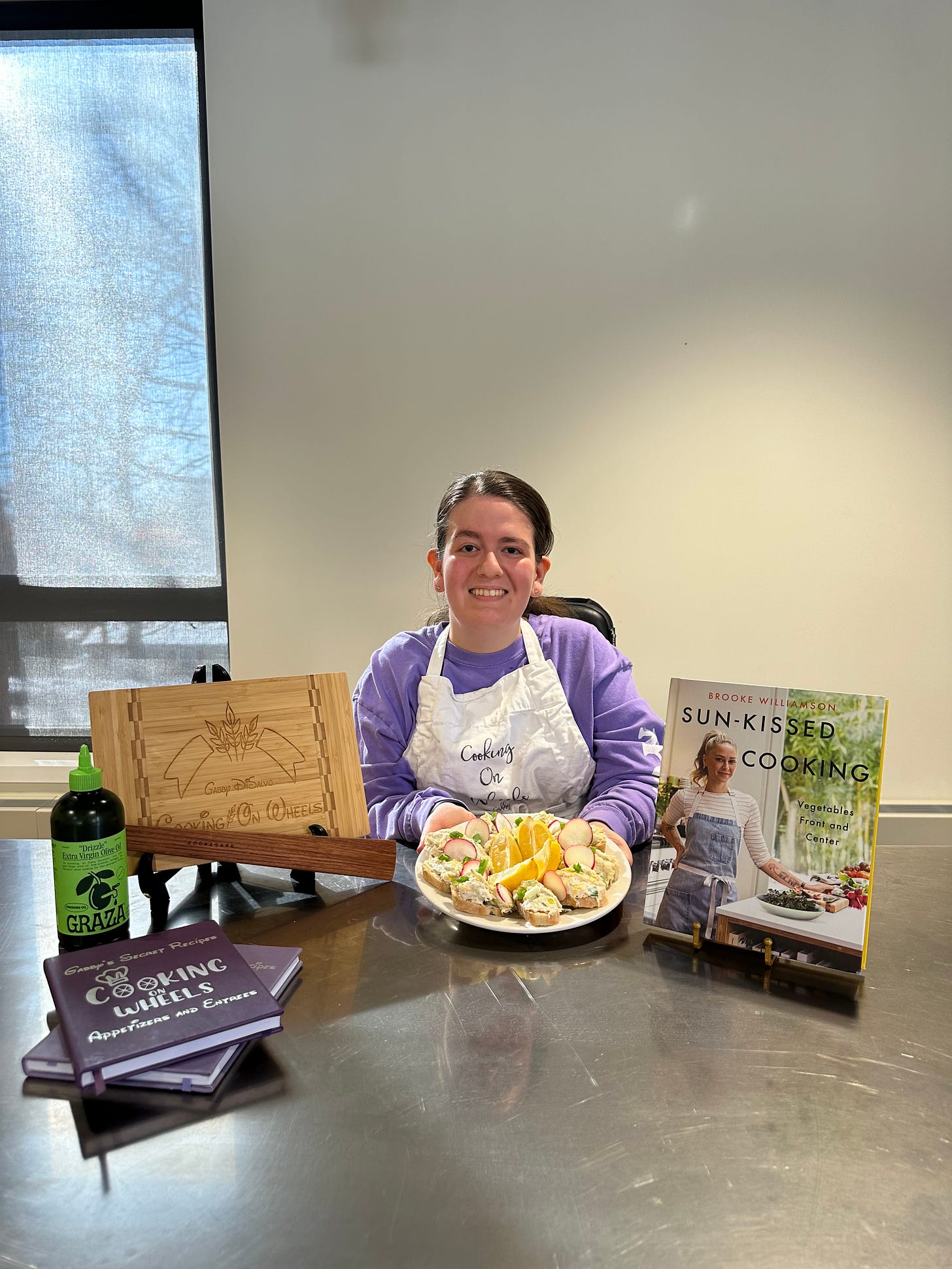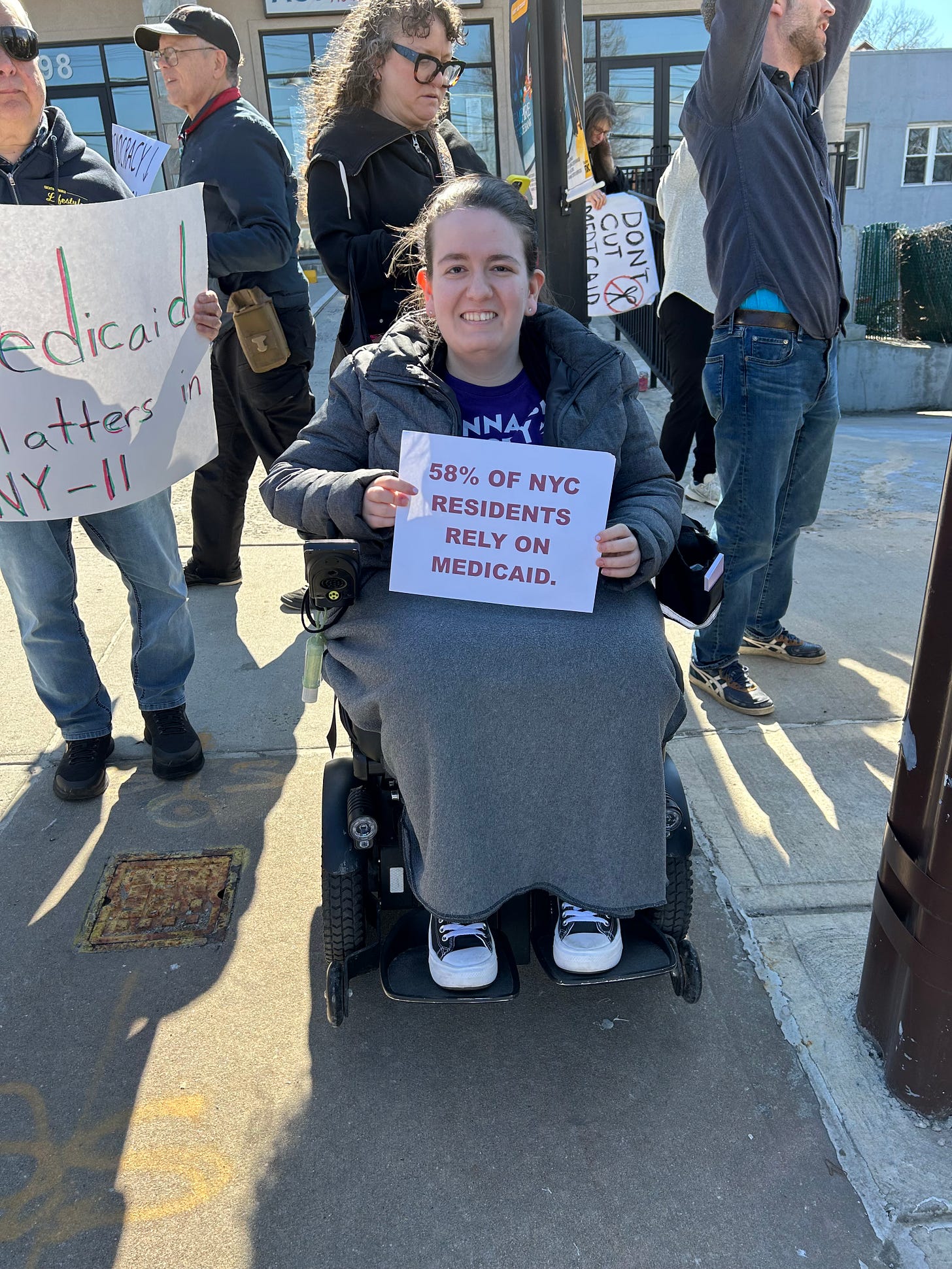Profile in Peril: Gabby
Trump's cruel cuts will hurt a popular TV chef. Rep. Nicole Malliotakis (NY-11) doesn't seem to care.
This is the second in a series of Profiles in Peril—snapshots of forgotten Americans facing the direct effects of Trump’s sadistic budget cuts. It’s by the peerless editor and writer Tom de Kay. Please feel free to share far and wide, and reuse images, video, and text.
For half of her life, Gabby DiSalvo was not okay with being disabled.
She was one of few wheelchair users in her Staten Island neighborhood, and one of the first disabled kids at her elementary school. “There was no wheelchair basketball or anything like that,” she says. “When I was eight, if someone said I was disabled I’d say, ‘No, I’m not.’ If a photograph was being taken, I’d insist on getting out of the chair. I just wanted to look like my friends.”
Now 20 and a junior at the University of Connecticut, Gabby was diagnosed in infancy with myofibrillar myopathy (MFM), a rare neuromuscular disease that has left all her muscles about 16 times weaker than they would be otherwise. She could walk a bit as a child, but the swaying motion it required took a toll on her spine—which led to a surgery, at 10, that put an unexpected end to walking.
“Yeah, I was not happy,” she says. “For a very long time.”
These days, though, she embraces her disability, along with a life that includes majoring in disabilities studies and hosting a DIY TV show called “Cooking on Wheels.” As for her wheelchair, she’s “very, very grateful” for it. “My wheels are my freedom.”
Gabby, an upbeat, animated, mile-a-minute talker, uses the word freedom a lot. It’s something she’s often felt deprived of. It’s also something she’s now worried about losing, as Congress moves closer to cutting the funding that makes her independence possible. She and her family are registered to vote in NY-11, where Trumper Rep. Nicole Malliotakis has gone along with the cuts.
(Call Nicole Malliotakis and let her know how important Medicaid is to you at 202-225-3371.)
Gabby’s outlook on her disability changed in eighth grade, when she realized that staying quiet about it, even with close friends, meant hiding an important part of herself. By the end of that year, she had organized a rare-diseases fundraiser that sparked a passion for disability advocacy.
Around the same time, Gabby experienced the life-changing impact of personal-care assistants (PCAs). For years after her surgery, she couldn’t transfer herself; someone else had to lift her every time she got in or out of her chair. A Medicaid-funded PCA who came to the house a few afternoons a week allowed her single mother time to make dinner, care for Gabby’s brother, and keep the household running.
At U. Conn., PCAs are even more essential for Gabby. She’s learned to transfer herself—“I’m stubborn,” she says—but because “weak muscles mean weak balance,” she needs someone to keep her from falling, and help her up if she does fall. She also needs help with tasks that involve lifting her arms high, like washing her hair. And, since every exertion takes a lot out of her, even assistance in putting on her shoes can save energy for the day.
PCA support has enabled Gabby to thrive at U. Conn. She has a 3.6 GPA in an independent-study major, and “Cooking on Wheels,” which began as an Instagram diary of pandemic-era experiments in the kitchen, has found a passionate audience on the university’s TV station. She has even appeared on “The Rachel Ray Show,” alongside one of her biggest role models.
None of this would be possible without Gabby’s PCAs or other Medicaid-funded support, including her fitness trainer.
On April 10, House Republicans passed a budget resolution that calls for slashing close to $880 billion for Medicaid over 10 years. Programs like the ones Gabby relies on would be hit hard.
“I think about this a lot,” Gabby says. “If they cut back the hours for aides, I’d have to plan out every hour just to shower or wash my hair.” She added, “it would basically end my social life.”
She’d also be risking falls and injuries. And without being able to transfer safely, she’d have less access to bathrooms. If the cuts mean no PCAs at all, she’d have to leave U. Conn. and move back to her mother’s house on Staten Island. Her ambitions for graduate school or culinary school would be finished.
Worst case, if at some point her mother couldn’t transfer her—“she already doesn’t have the physical strength to be my full-time aide”—Gabby could end up without any care at all.
Disabled people make up more than 16 percent of the world’s population. “To see such a major group of people being told ‘we don't want you here’ and ‘you don't belong’ and ‘we're going to do everything in our power to make sure that you can't be treated equally like everyone else’—there aren’t any words to describe how painful it is.”
Gabby tries to stay hopeful. Some of that is what she calls a “let’s-not-go-there” impulse. Still, as for so many Americans whose dreams are threatened by the DOGE cuts, “anxiety creeps in.”








RFK Jr.’s recent comments on “the tragedy of autism” indicate a grotesque misapprehension of disability in general and the autism spectrum in particular. If he’s the apologist for MAGA cruelty, it’s not working.
I reside in a blue state, where the challenges being disabled are met with financial support by our counties and communities first and foremost.
Knowing, I was fortunate to have the opportunity to overcome my physical limitations with financial support from a number of programs in my time of need.
I certainly wish the same for anyone facing life with a disability.
Exceptionally crafted piece!!